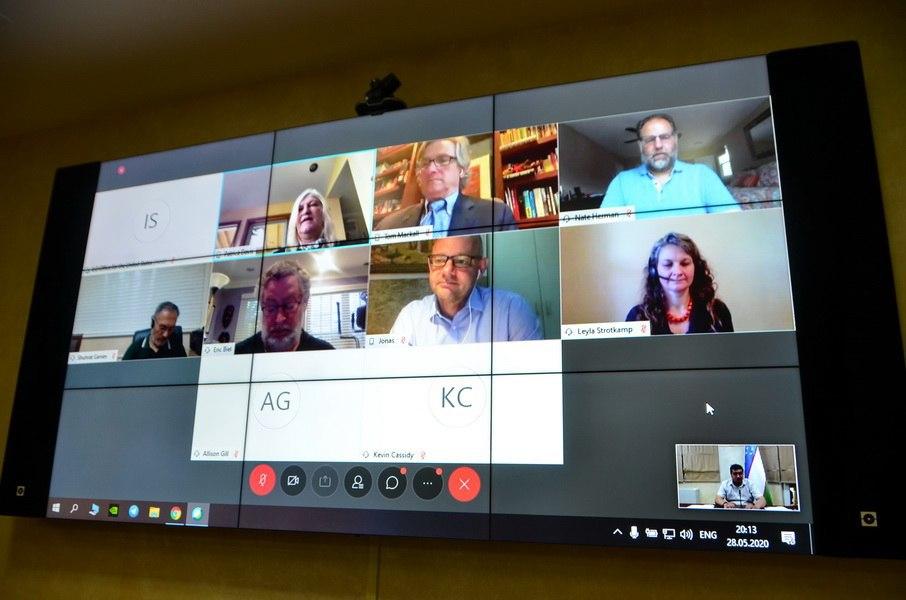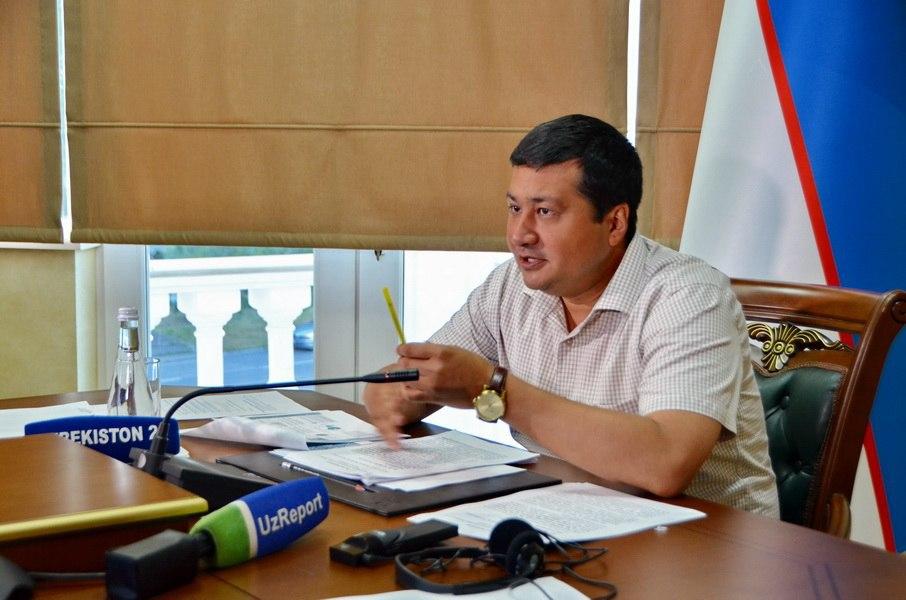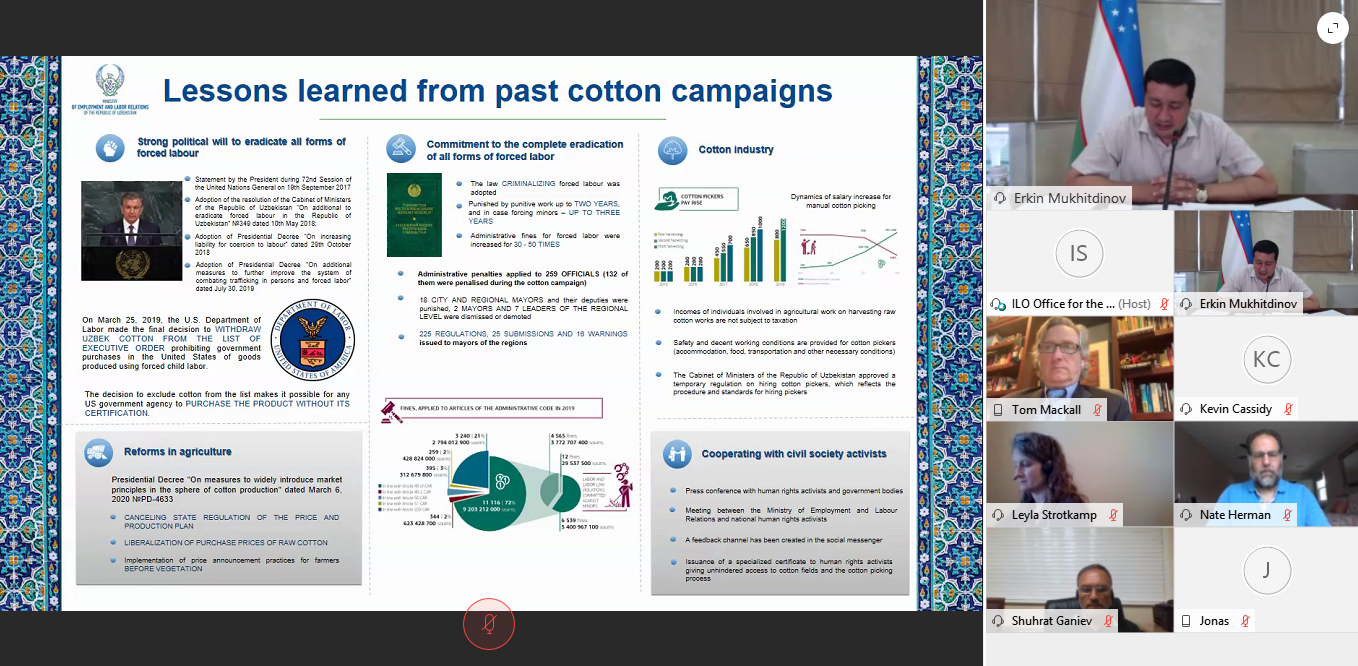Uzbekistan and international community: decent work and human rights at spot
Dialogue between Uzbekistan and the international community on the protection of workers’ rights has reached a new level. On May 28, ILO organized international webinar “Beyond Cotton: Lessons Learned and Next Steps in Uzbekistan”. This was the first time when representatives of ILO, Ministries of Labor of Uzbekistan and USA, civil society, human rights organizations, as well as leading American business associations gathered at the “virtual” table of negotiations. The webinar also became the follow-up step of open letter from Minister of Employment and Labor Relations Mr. Nozim Khusanov to the Cotton Campaign coalition in the dialogue to lift the boycott of Uzbek textiles.

The following speakers gave their expert presentations during the webinar: Mr. Erkin Mukhitdinov, First Deputy Minister of Employment and Labor Relations; Mr. Kevin Cassady, Director of ILO Office for the US; Mr. Jonas Astrup, Chief Technical Adviser, ILO Tashkent; Mr. Nate Herman, Senior Vice President of the American Apparel and Footwear Association (AAFA); Ms. Leyla Strotkamp, Representative of the Bureau of International Labor Affairs (ILAB), Department of Labor; Mr. Eric Biel, Senior Adviser, Fair Labor Association (FLA); Ms. Allison Gill, Coordinator at Cotton Campaign coalition; Mr. Shukhrat Ganiev, civil society activist. Mr. Tom MacKall, Senior Counsel in USCIB, moderated the Webinar.
Mr. Mukhitdinov presented the situation on the Uzbek labor market, providing detailed statistics and figures, some of which were announced for the first time. He highlighted five lessons learned from the 2019 cotton harvest campaign and introduced a number of initiatives to jointly address decent work issues.
First Deputy Minister noted that the issue of job creation is urgent not only in Uzbekistan, but around the world, due to the global COVID-19 pandemic. The acceleration of the development of the textile sector could become a key part of the solution for job creation as it is one of the country’s leading sources of employment. But this will be impossible without the support of international organizations, the textile market, and business. In this regard, it is planned to strengthen local subdivisions and districts by conducting large-scale trainings on the unacceptability of forced labor for inspectors and their assistants, employers, khokims, farmers, cotton and textile cluster workers, with the involvement of national and international ILO experts. In addition, responsibility for forced labor will be strengthened through trainings for judges, prosecutors, and lawyers on these issues. Clarifications will be provided with regard to recruitment, the proper execution of employment contracts, as well as the capacity of district employment promotion centres for the recruitment of workers by agricultural companies will be strengthened.

Another important step will be to increase the number of civil society activists in each region. Using that opportunity, Mr. Erkin Mukhitdinov invited Cotton Campaign for direct cooperation during the monitoring of the 2020 cotton harvest. An important emphasis was placed on creating a four-way mechanism for interaction between the government, cotton farmers, and textile manufacturers, foreign brands and civil society groups on the elimination of forced labor.
“Any form of forced labor has serious negative consequences for the development of Uzbekistan’s cotton and textile industries, and affects the country’s reputation. Over the past 4 years, the number of cases of forced labor during the cotton harvest season has decreased fourfold – from 448 000 people in 2015 to 102 000 in 2019. The Government of Uzbekistan continues its consistent policy to ensure decent work conditions throughout the country,” noted Mr. Mukhitdinov.
In presentation “The Impact of Reform and Collaboration on Ending Child and Forced Labor”, Mr. Jonas Astrup briefly presented the main results of the of third party monitoring, which is carried out annually during the cotton harvest process. According to the report, 1.75 million people took part in the harvest in 2019 – more than 94% of pickers participated voluntarily. No systematic involvement of students, teachers, doctors or nurses was detected. However, 102,000 people (5.9%) were subject to some form of coercion. This figure is 40% less than in 2018. Mr. Astrup emphasized that the efforts to combat forced labor were supported by the Government’s economic reforms aimed at abandoning the planned economic management model in favor of market mechanisms.
Nevertheless, there are a number of obstacles, mainly at the level of regional administrations, that prevent the eradication of forced labor and the protection of labor rights of citizens as the national economy grows.
“Uzbekistan is moving rapidly towards transforming the old centralized agricultural system into a model of textile and garment exporter. The country still has much to do to eradicate forced labor, but the reforms are working and must be supported by the international community,” said Mr. Jonas Astrup. “Responsible international investors can promote compliance with international labor standards and create hundreds of thousands of decent jobs. Farmers and clusters must now focus on value chain and job creation in line with internationally recognized standards. ILO stands ready to support this process.”
Ms. Leyla Strokamp then spoke about ILAB’s contribution to eradication of child and forced labor in Uzbekistan. She stressed that the support of the Bureau of International Labor Relations under the U.S. Department of Labor was based on the vision of a holistic approach to solving the problem. She noted that development and improvement of such spheres as labor inspection, labor market policy, labor protection and health can be the foundation for further progress.
Mr. Shukhrat Ganiev talked about the development of cooperation between the government and civil society, as well as the involvement of its representatives in monitoring of cotton harvesting. He noted that Third Party Monitoring has acquired the function not only of identifying cases of forced labor, but also of acting as an information channel for the country’s population.
In addition, Nate Herman presented the impact of the COVID-19 pandemic on the clothing and footwear industry in the United States. In particular, retail sales fell by 8.9% in April 2020, while employment fell by almost half. Mentioning Uzbekistan’s achievements, the vice president also underlined that the country has good opportunities for establishing cooperation with American companies, given the measures taken in the U.S. to revise trade relations with China.
“We consider Uzbekistan to be part of our industry. The government has done much to implement reforms, and we hope to be able to provide additional guarantees for U.S. major brands. But for this, Uzbekistan must ensure the eradication of forced labor,” noted Mr, Herman.
Following the presentations, Mr. Eric Biel shared his comments on the development of a detailed training program on fair employment of seasonal workers and expressed readiness to present it to all stakeholders in Uzbekistan. Ms. Allison Gill mentioned that the coalition welcomes Uzbekistan’s recognition of the problem of forced and child labor, and the adoption of measures to eradicate it. The Cotton Campaign calls on the Government of Uzbekistan to engage as many activists as possible to conduct monitoring to ensure transparency and create an enabling environment for responsible investment.

After QA session, each of the participants shared their vision of further actions to reform the policy of decent work in Uzbekistan, and proposals for further cooperation. The dialogue continues already in multilateral format and the Government of Uzbekistan plays a proactive role in it.









